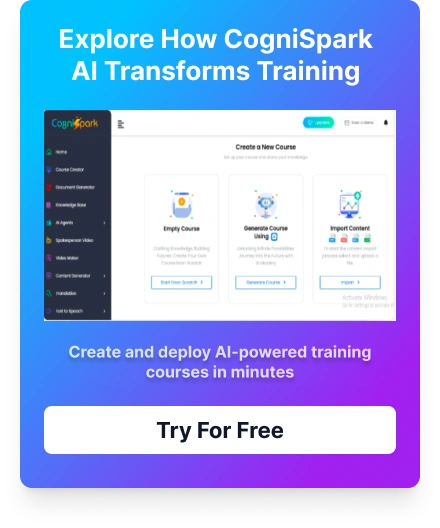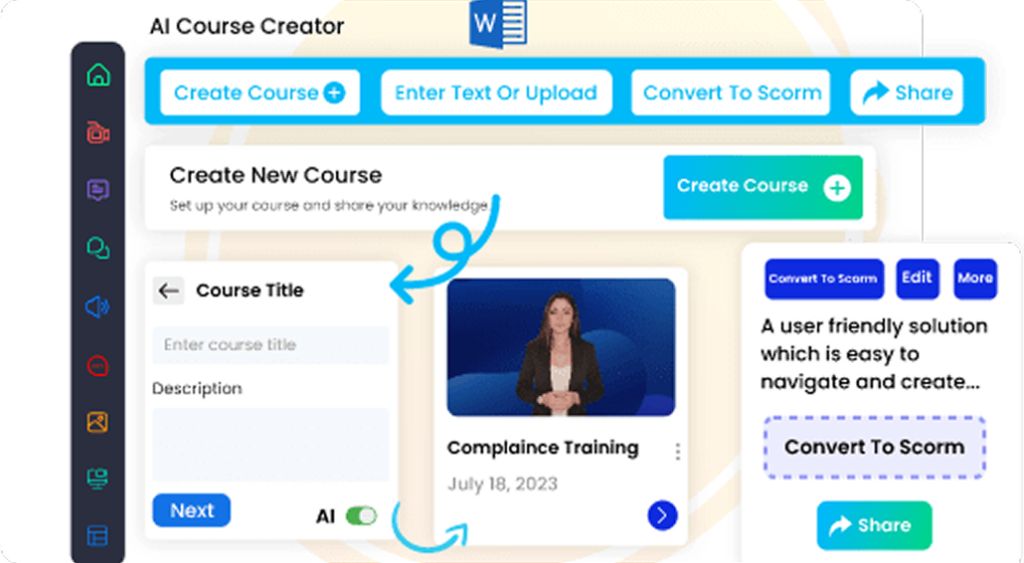The landscape of digital learning is undergoing a massive shift. Instructional designers are expected to create more courses in less time—without compromising quality or learner engagement. This is exactly where an AI course generator for instructional design becomes a game-changing tool.
By automating planning, drafting, curation, and analytics, AI shortens development cycles by up to 80%, enabling rapid rollout of high-quality training programs. Let’s explore how AI delivers these results in a practical, impactful way.
Why AI Is Changing Instructional Design Faster Than Ever
Efficiency Meets Intelligence
AI increases productivity by handling the heavy lifting—like content drafting, sequencing, and refinement. Instead of starting with a blank page, instructional designers receive structured, pre-organized content that’s ready to customize. This intelligence allows teams to shift focus from manual work to creativity, quality improvement, and strategic planning.
The E-Learning Market Demands Speed
As corporate training expands globally, the pressure to release content quickly continues to rise. AI helps organizations meet this demand by accelerating every stage of course creation—from ideation to deployment—making it easier to keep up with market changes, new regulations, or shifting skill requirements.
Technological Advancements
Natural Language Processing, machine learning, and automation have matured significantly. These advancements allow AI tools to understand context, adapt tone, create assessments, and optimize content like a seasoned designer—making AI-enabled instructional design more reliable and accessible.
Lower Development Costs
Instead of hiring large teams or outsourcing content development, AI helps reduce dependency on extensive manpower. By automating recurring tasks, organizations save time, money, and creative energy—making training development more cost-efficient and scalable.
Why AI Is Changing Instructional Design Faster Than Ever
Each point below is now described in depth to address both process and impact.
1. Smart Blueprint & Course Structure Creation
AI transforms the slow, manual process of outlining a course into an instant blueprint. It analyzes learning objectives, target audience, required competencies, and suggests a structured module layout. This ensures the course begins with a strong pedagogical foundation, saving days of planning work and helping designers move quickly into content development.
2. Fast Drafting of Lessons and Assessments
AI tools generate detailed content drafts for lessons, quizzes, examples, and assessments. These drafts serve as a base layer designers can refine. This approach eliminates the most time-consuming part—initial creation—while ensuring the materials are aligned to learning outcomes and instructional standards.
3. Adaptive Learning Journeys
Instead of delivering one-size-fits-all learning, AI analyzes learner data to adjust difficulty levels, recommend relevant activities, and reorganize modules. This ensures learners progress at their ideal pace. It also saves designers time, as they no longer need to manually build multiple versions of the same course.
4. Rapid Content Curation
Researching content takes a substantial portion of a designer’s time. AI scans global knowledge bases, internal documents, academic content, and multimedia libraries to recommend the most relevant information instantly. This reduces hours of searching and ensures courses stay current, reliable, and resource-rich.
5. Instant Grading & Feedback
AI-powered assessment tools instantly evaluate quizzes, assignments, and open-ended responses. Learners receive feedback immediately, keeping them engaged and motivated. For designers and instructors, this eliminates verbose review cycles and frees up time for more meaningful learner support.
6. Data-Driven Instructional Enhancements
AI monitors user engagement, performance patterns, quiz difficulty levels, and content drop-off points. It then recommends updates—such as rephrasing complex lessons, adding visual aids, or adjusting pacing. This turns course optimization into a continuous, automated cycle instead of periodic manual audits.
7. Effortless Localization & Accessibility
Expanding courses to new languages and regions becomes significantly easier with AI. It can translate content, reformat text for different reading levels, add voiceovers, and ensure WCAG-compliant accessibility. This allows instructional designers to scale courses globally without rewriting content from scratch.
8. Real-Time Learner Support
AI-powered chatbots understand learner queries, provide instant clarification, guide them through modules, and offer personalized recommendations. This reduces the workload on instructors and increases course completion rates by giving learners on-demand support and reducing frustration.
9. Workflow Automation Across LMS
AI integrates with LMS platforms to automate tasks such as enrollment, notifications, tracking progress, generating certificates, and updating learning paths. This allows teams to manage thousands of learners efficiently without spending hours on administrative responsibilities.
10. Continuous Course Evolution
AI-driven analytics evaluate live course performance—identifying what’s working and what isn’t. Based on insights, it recommends content updates, restructuring, or additional resources. This ensures courses stay fresh, effective, and aligned with evolving learner expectations and organizational needs.
Best Practices for AI-Enhanced Instructional Design
Align Learning Goals
AI performs best when learning objectives are clear and measurable. This ensures all generated content—lessons, examples, questions—directly supports intended outcomes.
Maintain Responsible Data Use
Organizations must prioritize ethical use by securing learner data, obtaining clear consent, and preventing algorithmic bias. Transparent policies reinforce trust among users.
Keep Humans in the Loop
AI speeds up work, but human expertise ensures relevance, tone, context, and cultural accuracy. Designers remain essential for polishing AI outputs into engaging learning experiences.
Track Key Performance Metrics
Evaluate success through development speed, learner engagement, content accuracy, and ROI to continually optimize your instructional design strategy.
Final Thoughts
AI is transforming instructional design by accelerating content creation, improving personalization, and enabling continuous optimization. With an AI course generator for instructional design, teams can build high-quality courses significantly faster and adapt more easily to evolving learner needs.
When combined with the Paradiso Authoring Tool, this process becomes even more powerful—AI generates smart, structured content, while Paradiso refines it into interactive, branded, and deployment-ready learning experiences. This integrated approach accelerates development cycles, enhances course quality, supports scalable and consistent production, and ensures every learning module benefits from data-driven improvement throughout its lifecycle. Together, AI and Paradiso create an efficient, modern, and future-ready digital learning ecosystem.

























